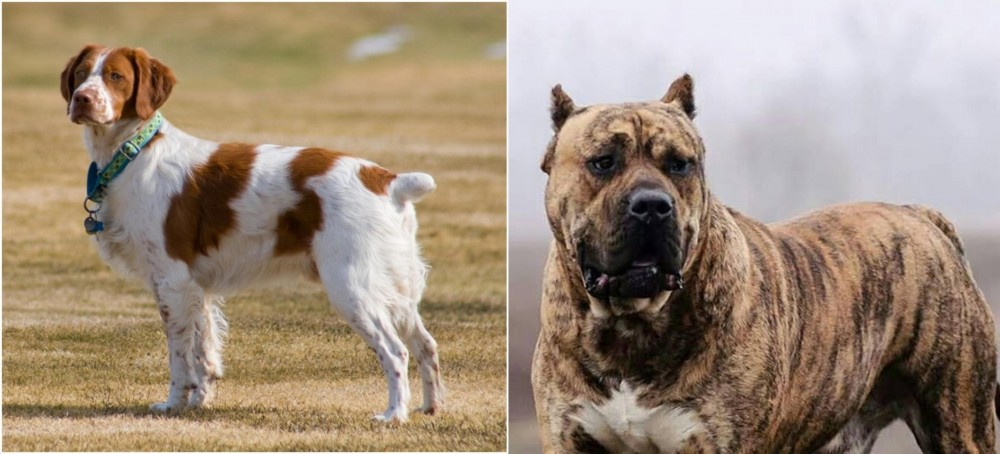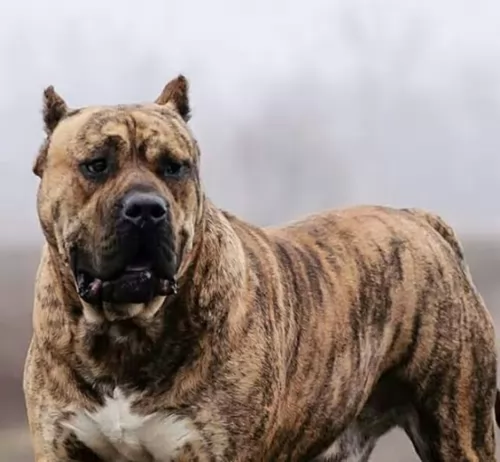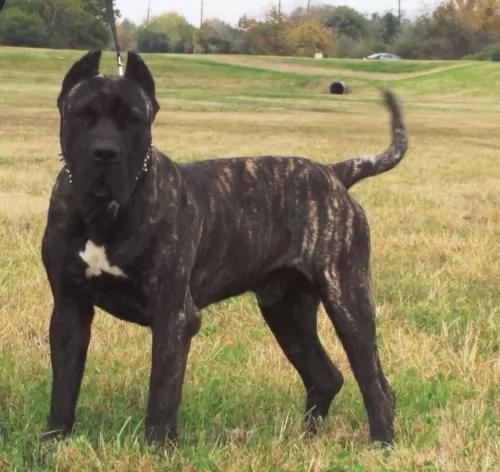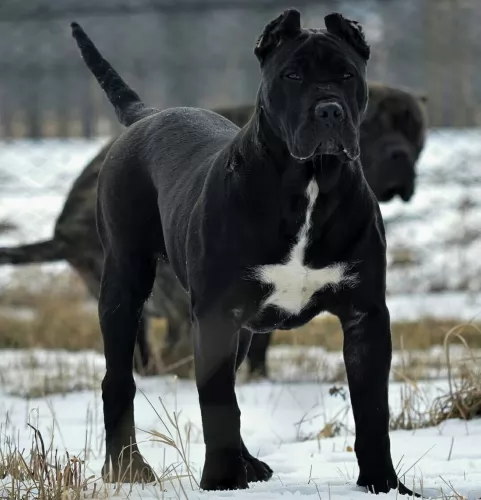 Petzlover
Petzlover French Brittany is originated from France but Perro de Presa Canario is originated from Spain. French Brittany may grow 46 cm / 18 inches shorter than Perro de Presa Canario. French Brittany may weigh 50 kg / 110 pounds lesser than Perro de Presa Canario. Both French Brittany and Perro de Presa Canario has almost same life span. Both French Brittany and Perro de Presa Canario has almost same litter size. Both French Brittany and Perro de Presa Canario requires Low Maintenance.
French Brittany is originated from France but Perro de Presa Canario is originated from Spain. French Brittany may grow 46 cm / 18 inches shorter than Perro de Presa Canario. French Brittany may weigh 50 kg / 110 pounds lesser than Perro de Presa Canario. Both French Brittany and Perro de Presa Canario has almost same life span. Both French Brittany and Perro de Presa Canario has almost same litter size. Both French Brittany and Perro de Presa Canario requires Low Maintenance.
 Brittanys are the product of France, actually developed in the Brittany Province. They are gun dogs designed to hunt birds. Referred to more often than not as a Spaniel their method of working is much more in line with the setters and pointers. They are believed to be developed somewhere between the 17th and 19th centuries, but not recognized until the 20th century. Orange and white dogs were portrayed on 17th century tapestries, hunting and retrieving. In 1850 the Reverend Davies wrote the first record of Brittanys that was verifiable.
Brittanys are the product of France, actually developed in the Brittany Province. They are gun dogs designed to hunt birds. Referred to more often than not as a Spaniel their method of working is much more in line with the setters and pointers. They are believed to be developed somewhere between the 17th and 19th centuries, but not recognized until the 20th century. Orange and white dogs were portrayed on 17th century tapestries, hunting and retrieving. In 1850 the Reverend Davies wrote the first record of Brittanys that was verifiable.
The Brittany was recognized for the first time in 1907 as their own breed even though they participated in the Paris Dog Show in 1900. Once recognized the standards were written as well. It was not until 1931 that the breed was recognized in America and 1934 before the American Kennel Club approved them. Until 1982 they were known as the French Brittany Spaniel. The Spaniel was dropped in ’82. In the United Kingdom the Brittany is known as an HPR (Hunt, Point and Retrieve) breed and they do so with both birds and small game such as hares. The Brittany’s have more dual champions than any other American Kennel Club Sporting Breed in both Confirmation and Field Trials.
There are some differences between the current day French Brittany and the “American Brittany”. They are the same breed but different sub-sets and there are differences that can be noted between the two. The French Brittany is smaller than the newer American version and works closer to the hunter and the guns, while the American Brittany runs ahead of the hunter quite often. Some breeders however don’t consider these differences to be sub-sets and believe that the American breeders should accept the French standards reflecting the origin of the breed.
 This large dog, also known as the Canary Mastiff, is a rare Molosser-type dog hailing from the Canary Islands.
This large dog, also known as the Canary Mastiff, is a rare Molosser-type dog hailing from the Canary Islands.
It does appear as if, according to records, that these dogs were also consumed at one time. The dog has also been used as a cattle dog as well as being used for dog fighting till the middle of the 1900s. Dog fighting was prohibited in the 1940s but it continued for a number of decades.
As people became interested in other dog breeds, the Presa nearly died out but some breeders revived the breed because of it having some good characteristics – territorial, brave, protective and intelligent. The FCI recognized the dog in 2011.
 The French Brittany is an energetic, compact, solid, athletic dog. They have average size heads, intelligent expressions, floppy ears, and a long, elastic and free gait. Most Brittanys are born with short tails but if not, they are docked outside the United Kingdom. Docking is illegal in the United Kingdom so those Brittanys might have a long tail.
The French Brittany is an energetic, compact, solid, athletic dog. They have average size heads, intelligent expressions, floppy ears, and a long, elastic and free gait. Most Brittanys are born with short tails but if not, they are docked outside the United Kingdom. Docking is illegal in the United Kingdom so those Brittanys might have a long tail.
Their coats are orange roan, orange and white and liver roan. A tricoat of orange, liver and white is allowed within a specific placement of the three colors.
 The Perro de Presa Canario or Canary Dog is large and muscular. He stands at 58 to 66cm in height and weighs anything from 40 – 70kg. He has a deep bark.
The Perro de Presa Canario or Canary Dog is large and muscular. He stands at 58 to 66cm in height and weighs anything from 40 – 70kg. He has a deep bark.
The head is broad and the ears are normally cropped to give him a more aggressive appearance. With ear cropping being banned the ears are close fitting to the head and are floppy. This is one of those dogs where the rear of the dog is slightly higher than the shoulders.
The coat is short and there is no undercoating. It is available in all different shades of fawn and brindle. The breed standard requires the dog having a black mask.
Canine experts tell us that this large working dog has got such fearless guardian characteristics that they wouldn’t recommend this dog for first time dog owners. On the other hand however, there are dog owners who claim that with good socialization, this dog becomes docile and amicable around their human family.
He is a clever dog so training and socialization will be easy and it will be worth it. This is a dog noted for its strength, it’s strong personality and potential for aggression, so training and socialization will be most important.
Dual champions in Field Trials and Confirmation. They both point and retrieve.
They are not as adaptable as some hunting breeds. They are very active and need space both indoors and out. They are not recommended for life in apartments in the city. A rural environment is best. They do not adapt well to the damp and cold weather.
They are very intelligent and have very high learning ability.
 Contrary to what many people think, the Perro de Presa Canario can be a calm, gentle dog when trained and socialized properly.
Contrary to what many people think, the Perro de Presa Canario can be a calm, gentle dog when trained and socialized properly.
It is only when you bring an older, unknown dog into your midst that you would have to exercise caution with him as he can then be aggressive.
Dogs become dangerous and aggressive when they are brought up by aggressive, uncaring people. Humans are always to blame for the way a dog turns out. Provide this large dog with a loving, caring home, and he’ll show you what a remarkable pet he can be.
 Generally, a hardy breed that is mostly healthy, the Brittany in France usually lives on average 12 years 6 months. In the UK the average if 12 years and 11 months and many dogs living to be 14 or 15. Some of the health issues that might pop up for the Brittany include:
Generally, a hardy breed that is mostly healthy, the Brittany in France usually lives on average 12 years 6 months. In the UK the average if 12 years and 11 months and many dogs living to be 14 or 15. Some of the health issues that might pop up for the Brittany include:
 The Perro de Presa Canario can live to be between 8 and 12 years of age. Being a large breed the dog can be susceptible to hip dysplasia and other problems such as cancer and heart problems. It is highly unlikely that a well cared for dog will get any of these illnesses.
The Perro de Presa Canario can live to be between 8 and 12 years of age. Being a large breed the dog can be susceptible to hip dysplasia and other problems such as cancer and heart problems. It is highly unlikely that a well cared for dog will get any of these illnesses.
It is far better to give your dog two smaller meals a day as opposed to one bigger meal as then he tends to wolf his food down. This can lead to bloat, where the stomach swells up and worse, it twists. This dangerous situation prevents fluid and air from escaping the stomach. Your dog is restless, he paces and salivates, wanting to vomit. Bloat can affect any dog at any age.
Kidney disease can develop because of some other illness or it can develop on its own. It can even be caused by bad teeth when bacteria enters the bloodstream of the dog.
 Feed puppies a high quality puppy food designed for medium sized dogs. Give about one to one and a half cups per day in 2-3 meals.
Feed puppies a high quality puppy food designed for medium sized dogs. Give about one to one and a half cups per day in 2-3 meals.
For the adult French Brittany feed a high quality adult dry food designed for medium sized dogs. Give about two cups per day in 2 meals.
Excellent vision and scent
The French Brittany is an active and enthusiastic bird dog that loves to exercise. They have the stamina and drive that goes with an efficient and successful hunting dog. They need daily exercise, regular walks and excel at field trials and confirmation. They are also good at lure chase, flyball, rally and obedience.
 This is a short haired dog, and he isn't a heavy shedder so beyond regular twice-a-week brushing he will simply need to have his eyes and ears checked for infections.
This is a short haired dog, and he isn't a heavy shedder so beyond regular twice-a-week brushing he will simply need to have his eyes and ears checked for infections.
He will also need to have his nails clipped and to check his teeth over too. A sore, bad tooth at the back of your pet’s mouth can cause terrible pain but also play havoc with his general health.
Your Perro de Presa Canario is a high-energy dog and he will need daily exercise. He will love a good walk but he will also need something more strenuous and demanding such as ball- and rope tug-of-war games.
Try and provide your large pet with a top quality commercially manufactured food – one that is packed with vitamins and minerals instead of colorants preservatives and toxic fillers.
Break the monotony of feeding him only kibble by mixing in some cooked chicken, brown rice, sweet potato, carrots and spinach. Dogs love consistency and simplicity and simple meals like this with some raw meat thrown in occasionally will keep him healthy and happy. Never leave him without a constant supply of fresh, cool water.